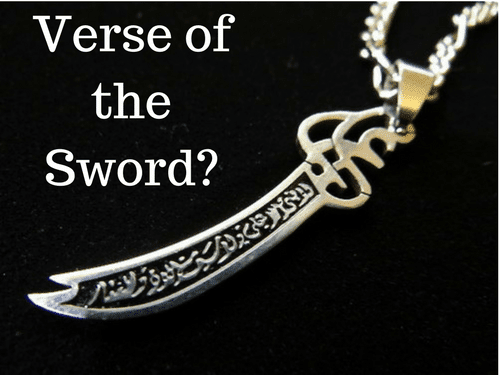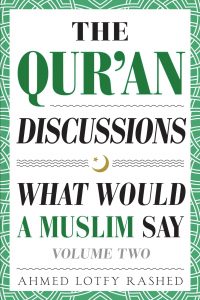Regarding ayahs 9:2–6, is God commanding an Islamic state to conduct a foreign policy, which is the following: First, make a treaty with idolatrous nations and if they maintain the terms of the treaty then peaceful coexistence is possible. Second, if these nations refuse to make a treaty or violate the terms of the agreement, then Muslims must go to war with them until they submit to an Islamic state. Is this the meaning of these ayahs?
Former WhyIslam.org visitor
In the Name of God, the Most Gracious, the Most Merciful:
First of all, there is a historical context to the 9th sura of the Qur’an. If you want to hear a detailed explanation of that historical context and how this informs the MAINSTREAM MUSLIM understanding of that part of the Qur’an, Nouman Ali Khan (one of my favorite speakers) has a very excellent podcast on that issue HERE.
If you want to read what unbiased non-Muslims say about Islam and Muslims, the link is HERE.
If you want to see formal statements by Muslim scholars and leaders against terrorism and against violating rights of non-Muslims, the link is HERE.
There are two important assumptions which have to be clarified regarding these verses. The first assumption (which I admit even a few Islamic scholars have made) is that these verses represent GENERAL instructions rather than SPECIFIC instructions in a specific context. The second assumption is that the purpose of this fighting is to impose Islamic rule. Both assumptions are not correct. So, the “foreign policy,” as you describe it, was only commanded for the Companions of the Prophet against their immediate enemies who were continually plotting against the nascent Muslim nation. However, it is NOT a general commandment on how all future Muslim nation-states should act vis-à-vis their non-Muslim neighbors.
Sheikh Hânî al-Jubayr, former judge of the Jeddah Supreme Court of Saudi Arabia, has said the following:
If the non-Muslim country did not attack the Muslim one nor mobilize itself to prevent the practice and spread of Islam, nor transgress against mosques, nor work to oppress the Muslim people in their right to profess their faith and decry unbelief, then it is not for the Muslim country to attack that country. Jihad of a military nature was only permitted to help Muslims defend their religion and remove oppression from the people. The Persians and Romans did in fact start aggression against Islam and attack the Muslims first. The Chosroe of Persia had gone so far as to order his commander in Yemen specifically to kill the Prophet (peace be upon him). The Romans mobilized their forces to fight the Prophet (peace be upon him), and the Muslims confronted them in the Battles of Mu’tah and Tabûk during the Prophet’s lifetime.
The early Muslims lived in a time when the default status of countries was to be “at war” until there was a formal “peace treaty.” We now live in a world where the default status is to be “at peace” until there is a “declaration of war.” It is not Islam that was spread by violence; rather it is the Muslim empire that spread this way. What I mean is that we must not confuse the political expansion of the Arabs with the religious expansion of Islam. The political powers of the time lived by maxim “conquer or be conquered,” and the Muslim polity lived the same way. They were playing the same “Great Game” as the rest of the civilizations around them.
The Qur’an clearly says: God does not forbid you to have friendly, mutually respectful relations with those who have not attacked you because of your religion and have not turned you out of your homes. God simply forbids you to take as your patrons those who attack you because of your religion or turn you out of your homes or conspire with others to turn you out of your homes. (60:6-8)
The Qur’anic injunction to fight was clearly connected with the very specific necessity of preserving the physical integrity of the Muslim community at a time and place when fighting, sometimes preemptively, sometimes defensively, was understood to be the only way to do so. Peace, i.e., the repelling of aggression, rather than conversion to Islam, was the ultimate aim of this fighting. This is clearly indicated by several verses, such as [2:193], [8:61], and very bluntly in [4:89-90].
Verse 9:29 is referring to the Jews of Khaybar who continued to conspire against the nascent Islamic community. The Christians of Najran were never attacked or even threatened, because they came to terms with the Prophet before any hostility could even develop. Since there were no conspiracies coming out of their quarter, the Muslims never advanced upon them. However, the Jews of Khaybar, the Christians of Byzantium, and the Christians and Zoroastrians of Persia certainly DID make and execute plans to devour the new political power in Medina, so the Muslims were instructed to use force or the threat of force to impose a peaceful stance from their belligerent neighbors.
May peace be with you,
Ahmed
Thank you for responding to my previous questions. Could you please help me to understand the following ayahs from the Qur’an: Regarding ayah 9:23, it appears that God is commanding Muslims to sever all relations with family members who do not practice Islam. If these non-Muslim family members need help or economically depend on the Muslim member of the family, then abandoning them will hurt them. Is God requiring believers to completely break off all relations with members of their kin because they have a different religion?
. . . End of Excerpt . . .

Read more of this conversation in The Qur’an Discussions: What Would a Muslim Say – Volume 2.
Get your copy HERE.

